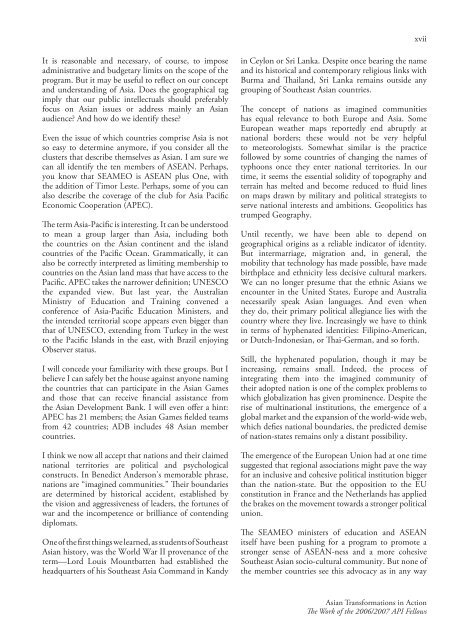Asian Transformations in Action - Api-fellowships.org
Asian Transformations in Action - Api-fellowships.org
Asian Transformations in Action - Api-fellowships.org
Create successful ePaper yourself
Turn your PDF publications into a flip-book with our unique Google optimized e-Paper software.
xviiIt is reasonable and necessary, of course, to imposeadm<strong>in</strong>istrative and budgetary limits on the scope of theprogram. But it may be useful to reflect on our conceptand understand<strong>in</strong>g of Asia. Does the geographical tagimply that our public <strong>in</strong>tellectuals should preferablyfocus on <strong>Asian</strong> issues or address ma<strong>in</strong>ly an <strong>Asian</strong>audience? And how do we identify these?Even the issue of which countries comprise Asia is notso easy to determ<strong>in</strong>e anymore, if you consider all theclusters that describe themselves as <strong>Asian</strong>. I am sure wecan all identify the ten members of ASEAN. Perhaps,you know that SEAMEO is ASEAN plus One, withthe addition of Timor Leste. Perhaps, some of you canalso describe the coverage of the club for Asia PacificEconomic Cooperation (APEC).The term Asia-Pacific is <strong>in</strong>terest<strong>in</strong>g. It can be understoodto mean a group larger than Asia, <strong>in</strong>clud<strong>in</strong>g boththe countries on the <strong>Asian</strong> cont<strong>in</strong>ent and the islandcountries of the Pacific Ocean. Grammatically, it canalso be correctly <strong>in</strong>terpreted as limit<strong>in</strong>g membership tocountries on the <strong>Asian</strong> land mass that have access to thePacific. APEC takes the narrower def<strong>in</strong>ition; UNESCOthe expanded view. But last year, the AustralianM<strong>in</strong>istry of Education and Tra<strong>in</strong><strong>in</strong>g convened aconference of Asia-Pacific Education M<strong>in</strong>isters, andthe <strong>in</strong>tended territorial scope appears even bigger thanthat of UNESCO, extend<strong>in</strong>g from Turkey <strong>in</strong> the westto the Pacific Islands <strong>in</strong> the east, with Brazil enjoy<strong>in</strong>gObserver status.I will concede your familiarity with these groups. But Ibelieve I can safely bet the house aga<strong>in</strong>st anyone nam<strong>in</strong>gthe countries that can participate <strong>in</strong> the <strong>Asian</strong> Gamesand those that can receive f<strong>in</strong>ancial assistance fromthe <strong>Asian</strong> Development Bank. I will even offer a h<strong>in</strong>t:APEC has 21 members; the <strong>Asian</strong> Games fielded teamsfrom 42 countries; ADB <strong>in</strong>cludes 48 <strong>Asian</strong> membercountries.I th<strong>in</strong>k we now all accept that nations and their claimednational territories are political and psychologicalconstructs. In Benedict Anderson’s memorable phrase,nations are “imag<strong>in</strong>ed communities.” Their boundariesare determ<strong>in</strong>ed by historical accident, established bythe vision and aggressiveness of leaders, the fortunes ofwar and the <strong>in</strong>competence or brilliance of contend<strong>in</strong>gdiplomats.One of the first th<strong>in</strong>gs we learned, as students of Southeast<strong>Asian</strong> history, was the World War II provenance of theterm—Lord Louis Mountbatten had established theheadquarters of his Southeast Asia Command <strong>in</strong> Kandy<strong>in</strong> Ceylon or Sri Lanka. Despite once bear<strong>in</strong>g the nameand its historical and contemporary religious l<strong>in</strong>ks withBurma and Thailand, Sri Lanka rema<strong>in</strong>s outside anygroup<strong>in</strong>g of Southeast <strong>Asian</strong> countries.The concept of nations as imag<strong>in</strong>ed communitieshas equal relevance to both Europe and Asia. SomeEuropean weather maps reportedly end abruptly atnational borders; these would not be very helpfulto meteorologists. Somewhat similar is the practicefollowed by some countries of chang<strong>in</strong>g the names oftyphoons once they enter national territories. In ourtime, it seems the essential solidity of topography andterra<strong>in</strong> has melted and become reduced to fluid l<strong>in</strong>eson maps drawn by military and political strategists toserve national <strong>in</strong>terests and ambitions. Geopolitics hastrumped Geography.Until recently, we have been able to depend ongeographical orig<strong>in</strong>s as a reliable <strong>in</strong>dicator of identity.But <strong>in</strong>termarriage, migration and, <strong>in</strong> general, themobility that technology has made possible, have madebirthplace and ethnicity less decisive cultural markers.We can no longer presume that the ethnic <strong>Asian</strong>s weencounter <strong>in</strong> the United States, Europe and Australianecessarily speak <strong>Asian</strong> languages. And even whenthey do, their primary political allegiance lies with thecountry where they live. Increas<strong>in</strong>gly we have to th<strong>in</strong>k<strong>in</strong> terms of hyphenated identities: Filip<strong>in</strong>o-American,or Dutch-Indonesian, or Thai-German, and so forth.Still, the hyphenated population, though it may be<strong>in</strong>creas<strong>in</strong>g, rema<strong>in</strong>s small. Indeed, the process of<strong>in</strong>tegrat<strong>in</strong>g them <strong>in</strong>to the imag<strong>in</strong>ed community oftheir adopted nation is one of the complex problems towhich globalization has given prom<strong>in</strong>ence. Despite therise of mult<strong>in</strong>ational <strong>in</strong>stitutions, the emergence of aglobal market and the expansion of the world-wide web,which defies national boundaries, the predicted demiseof nation-states rema<strong>in</strong>s only a distant possibility.The emergence of the European Union had at one timesuggested that regional associations might pave the wayfor an <strong>in</strong>clusive and cohesive political <strong>in</strong>stitution biggerthan the nation-state. But the opposition to the EUconstitution <strong>in</strong> France and the Netherlands has appliedthe brakes on the movement towards a stronger politicalunion.The SEAMEO m<strong>in</strong>isters of education and ASEANitself have been push<strong>in</strong>g for a program to promote astronger sense of ASEAN-ness and a more cohesiveSoutheast <strong>Asian</strong> socio-cultural community. But none ofthe member countries see this advocacy as <strong>in</strong> any way<strong>Asian</strong> <strong>Transformations</strong> <strong>in</strong> <strong>Action</strong>The Work of the 2006/2007 API Fellows
















